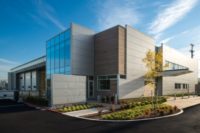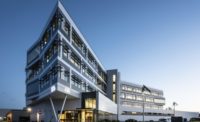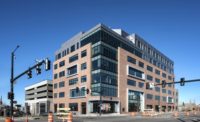IMPs Clad New Airport Hangar

Expanding Service
As American Airlines sought to improve operations and service its fleet efficiently, it embarked on the task of building a new double wide-body aircraft
maintenance hangar at Chicago O’Hare International Airport, the world’s sixth busiest airport. Dubbed Hangar 2, the 194,000-square-foot facility became the largest on the airfield at O’Hare, which is also the airline’s third-largest hub.
The longest-span structure for a maintenance hangar, Hangar 2 features dual entries and allows for more overnight workload capacity and daylight harvesting to reduce overhead lighting throughout the day. It also provides ancillary support functions, including a general back shop, component staging area, and storage areas.
Designers had to deliver a hangar that met the Chicago Department of Aviation’s Sustainable Airport Guidelines. In addition, the hangar needed to minimize impact on landing aircraft since it was to be built near active taxi lanes.
Light and Sustainability
Since the hangar would be in close proximity to a future runway, architects had to ensure the building maintained a low profile while still providing a 70-foot height clearance to accommodate aircraft being serviced. Designers selected CENTRIA’s Versawall insulated metal panels to serve as the external cladding for the lower 80 feet of the outer wall. Construction crews married the Versawall panels to translucent material for the upper 30 feet to minimize disturbance to aircraft landing systems and reduce light reflection for aircraft coming in on nearby runways. In addition to diminishing landing impact, the translucent panels allow natural daylight to enter the hangar.
“The CENTRIA panels’ durability and flexibility of length and thickness allowed us to create more than a big box and have visual details and an aesthetic exterior to make it a comfortable place for employees to come work,” said John Nimry, senior aviation architect with Ghafari Associates.
Nimry added that the building exceeds expectations by providing natural daylight from the translucent upper panels in a flexible, sustainable space – a critical piece in all new construction at O’Hare.
The Versawall panels from CENTRIA are engineered with thermally broken joint-to-joint connections, delivering consistent R-value throughout the vertical surface of the building. This contributes to lowering energy usage and energy costs over the long haul. In addition, the panels are approved by local authorities for fire and wind protection, which was critical for the facility given its location on the airfield.
“CENTRIA allowed us to accomplish unique details in our design and maintain panel integrity and all sustainability properties,” Nimry said. “The CENTRIA panels integrated well with the translucent panels, and having the CENTRIA team working with us from the start afforded us to extend parameters and reach the best solution for our design intent.”
While Versawall panels serve as the main exterior façade, architects chose Formawall Dimension Series insulated metal panels to emphasize the hangar doors and compliment the horizontal movements of the doors. In addition, IW-10A soffit panels align with Versawall panels and wrap under the canopy areas to maximize water protection.
Delivering Protection and Clean Design
Versawall delivers aesthetics, performance, sustainability and value. The lightweight system is flexible in design and provides an effective air and vapor barrier for weather resistance. Versawall panels feature a thermal break between face and liner that saves energy.
Formawall Dimension Series insulated metal panels consolidate six wall components into one product, creating a distinct architectural wall profile. The panels feature pressure-equalized side joints to prevent water infiltration and integrate with most wall, window and louver systems.
IW Series metal rainscreen panels eliminate exposed fasteners for a clean aesthetic. The single-skin panels minimize moisture intrusion and feature a common lock-joint design.
Taking Flight
Planning and design of the new hangar began in September 2016. After 18 months of construction, the hangar opened for business in November 2018. American Airlines Hangar obtained the point ranking of “2 Green Airplanes” for sustainability efforts from the Chicago Department of Aviation.
Looking for a reprint of this article?
From high-res PDFs to custom plaques, order your copy today!





